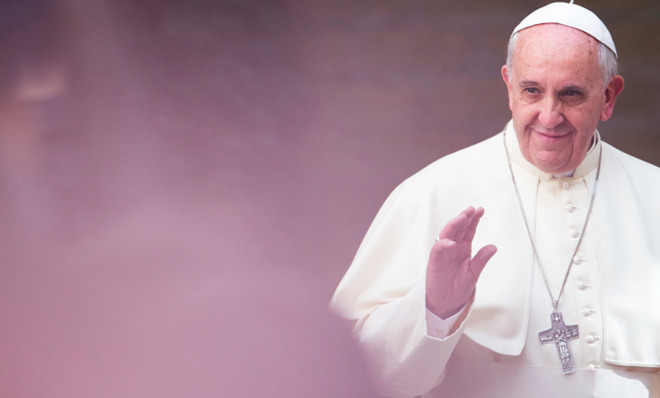Sorry, Fox News: Pope Francis is 'competent' enough to talk about economics
Judge Andrew Napolitano thinks the pope is out of his element. He's wrong.

A free daily email with the biggest news stories of the day – and the best features from TheWeek.com
You are now subscribed
Your newsletter sign-up was successful
By now we have developed a pattern when it comes to Pope Francis: Any time he critiques economics, there is a rush to explain why he's out of his element. On the appropriateness of the pope's economic commentary, for example, Fox News' Judge Andrew Napolitano poses and then answers his own question:
Is it a problem for the Roman Catholic Church? And is it something the pope is competent to comment upon or to resolve?... His encyclical is about economics, and it reveals a disturbing ignorance....
Thank God, so to speak, that his teaching authority is limited to faith and morals, because in matters of economics, he is wide of the mark. [Fox News]
(Note that Napolitano says he is Catholic and "a firm believer that Pope Francis is the Vicar of Christ on Earth.")
Yet to condescendingly (but always with the greatest reverence) say that Pope Francis is outside his purview isn't just a common refrain — it has echoes in another debate that Napolitano would probably not like to be associated with. Before Pope Francis ever arrived in Rome, analysts were concluding based on polls of U.S. Catholics that the church was "out of touch" when it came to issues like contraception. "Out of touch" is still a euphemism for "incompetent," even if it cloaks in gentler language the notion that the church lacks proper insight.
The Week
Escape your echo chamber. Get the facts behind the news, plus analysis from multiple perspectives.

Sign up for The Week's Free Newsletters
From our morning news briefing to a weekly Good News Newsletter, get the best of The Week delivered directly to your inbox.
From our morning news briefing to a weekly Good News Newsletter, get the best of The Week delivered directly to your inbox.
In other words, it doesn't matter what your complaint is when it comes to Catholic teaching; when convenient, just use the criticism that the church should stick to spiritual matters and shouldn't dabble in "amoral" subjects like science, economics, or what have you. Of course, this completely confuses church teaching.
When Pope Francis comments upon economics, he doesn't provide concrete, wonkish policy prescriptions. This is not because he lacks the insight or creativity to do so, but because his critiques are ultimately aimed at the subjects' moral dimensions. For example, Pope Francis recently concluded:
At the center of all economic systems must be man, man and woman, and everything else must be in service of this man. But we have put money at the center, the god of money. We have fallen into a sin of idolatry, the idolatry of money. [Patheos]
What Pope Francis' analysis means is that the economy, like all creations of humankind, should be placed at the service of human flourishing rather than the other way around. His warning that money can become a form of idolatry is also a distinctly theological observation, one that should come as no surprise to even cursory readers of the New Testament. Part of Pope Francis' purpose is to note that resources are not ends in themselves but means to flourishing, a quality that can't be achieved at the expense of others.
So it seems illogical to continually accuse Pope Francis and the rich tradition of social teaching he draws upon of being fundamentally outside their competence when it comes to matters of economics. That his critics seem to regard economics as lacking a moral dimension (and this requiring a more technocratic approach for "competent" commentary) is perhaps indicative of the very problem Pope Francis so often diagnoses.
A free daily email with the biggest news stories of the day – and the best features from TheWeek.com
It's undoubtedly uncomfortable to imagine that morality is a part of every economic decision, because doing so burdens economic activity with a profound moral duty, the sort that gets in the way of pure self-interest. But it's long been the job of the church to disrupt pure self-interest, especially when it becomes culturally embedded or systemically enshrined. If Pope Francis is causing a stir by upsetting the narrative that economics is amoral, then he is absolutely within his competence.